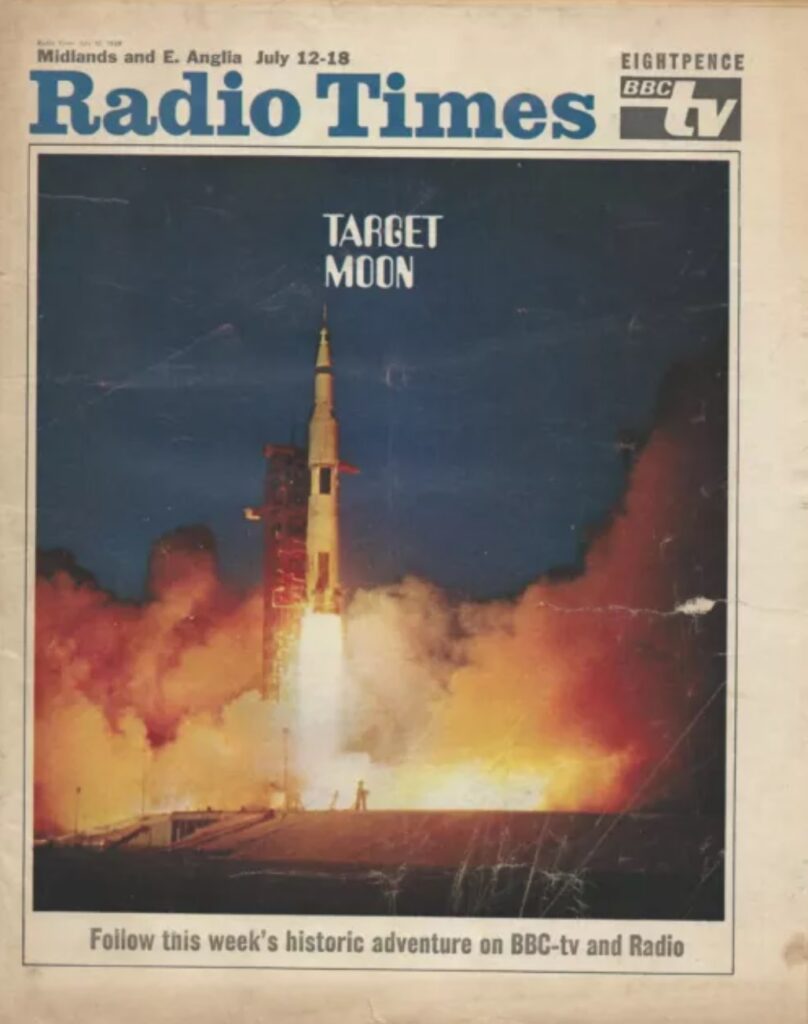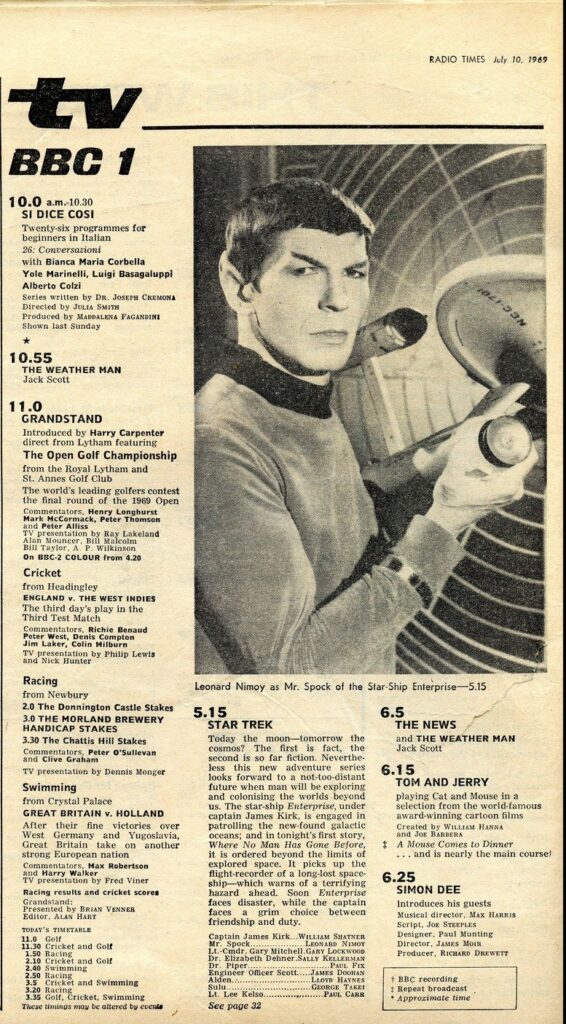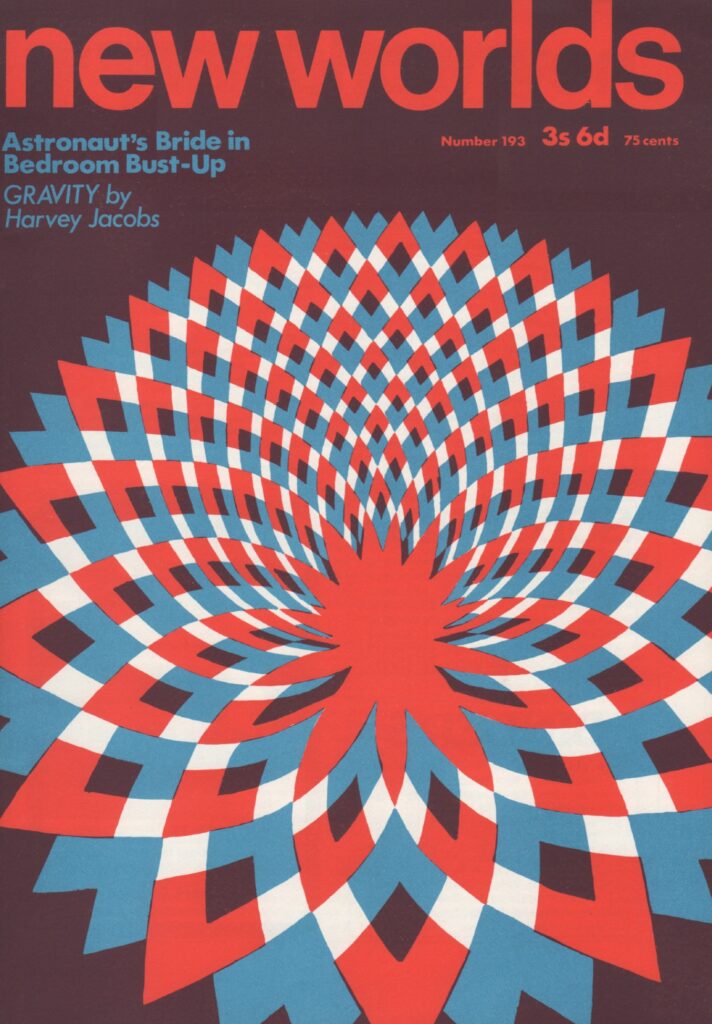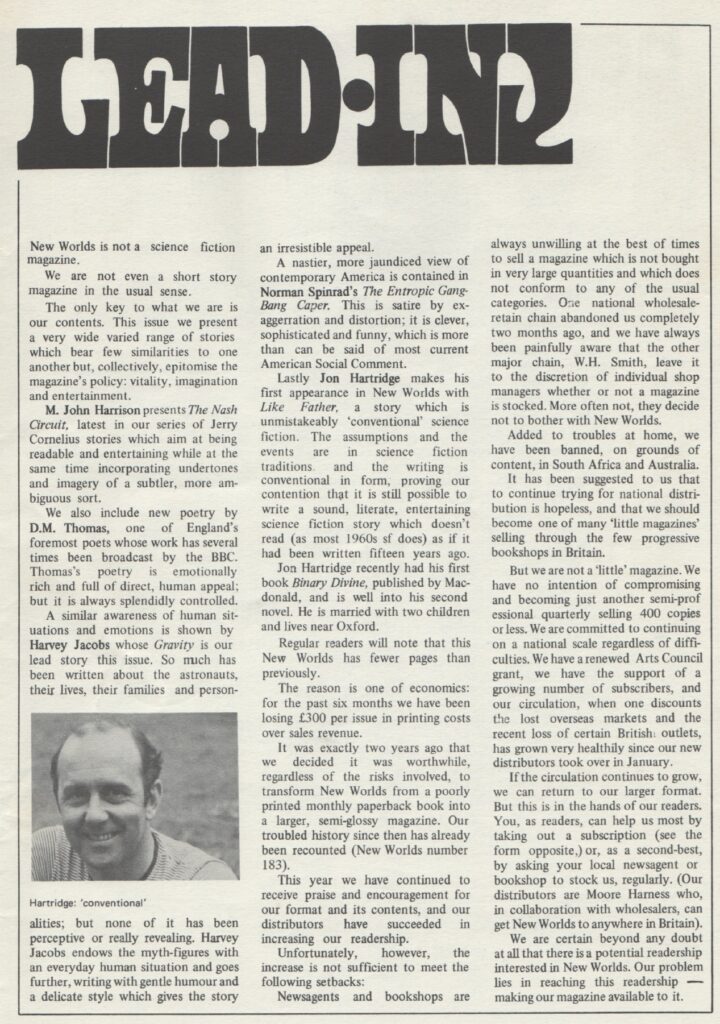
by Mark Yon
Scenes from England
Hello again!
Well since last month we’ve had the Moon landing, which I’m sure you’ve read all about from my colleagues here at Galactic Journey. It was quite exciting here in England too, even if events were happening well into the early morning hours.

Secondly, we’ve started showing episodes of Star Trek here in Britain.
 Programme description from The Radio Times, 12th July.
Programme description from The Radio Times, 12th July.
As the picture above from the Radio Times (the British BBC version of the TV Guide) shows, on July 12 I had chance to see Where No Man Has Gone Before. What a treat! How great to see Gary Lockwood from 2001: A Space Odyssey, and I loved Sally Kellerman. Not a bad start.
On the 19th July we saw The Naked Time, and last Saturday we saw The City on the Edge of Forever, which was a wonderful episode, and perhaps my favourite so far. According to the Radio Times, I understand we next see A Taste of Armageddon. Although a limited run, I hope they are all as good as what we’ve seen so far (although my colleagues here suggest they might not be!)
Anyway, back to New Worlds, number 193. There are a number of changes this month, most noticeably the price reduced – from 5 shillings to 3 shillings and sixpence – but also the fact that it is a thinner magazine. This issue is down to 34 (admittedly A4-sized) pages this month, from 68 last – half the size of what was a usual issue. More on this later.
 Cover by Charles Platt
Cover by Charles Platt
After the last two impressive covers by Mal Dean, we’re back to boring old nondescriptive images this time. Another sign perhaps that things are being done on the cheap. Don’t think this is going to persuade readers to buy the magazine, though with most sales becoming subscription based, the cover is partly irrelevant. You’ve paid your money up-front, after all.
Lead-In by The Publishers
You might remember me last month commenting on New Worlds celebrating five years of being the new version of the magazine, with its new agenda and format. This month the editor (this issue, it’s Charles Platt) takes it further. The first line of the Lead In is a bold statement: New Worlds “is not a science fiction magazine.”
What was hinted at last month is now written in detail – an explanation of what has been going on recently, followed by a flag-waving, trumpeting statement of intent, a clarification and exemplification of what Michael Moorcock, Charles Platt, Langdon Jones and others have said pretty much since they took over about five years ago. This introduction tells us that the journey has not been easy. Here is the statement in full:

 Photo by Gabi Nasemann
Photo by Gabi Nasemann
Jacobs last appeared with The Negotiators in the May 1969 issue. Gravity is a science-fiction story, despite what the editors proclaim, although the science fictional elements are really just background. A bored woman, married to an astronaut who has just gone into space, has an affair with a computer programmer. Cue lots of sexual references whilst meditating on the more esoteric elements of life, space and the universe. Oddly enough, I was not thinking about this whilst watching Apollo 11. 3 out of 5.
Poetry by D. M. Thomas
Four poems by D. M. – X, Grief, End of a Viking Settlement and Yseult. Little for me to say here, as normal. The first poem is “based upon The Cold Equations, a story by Tom Godwin”, although you’ll be hard pressed to find anything more than a general connection. This version is basically sex, allied with a different poem in the margin. 3 out of 5.
The Nash Circuit by M. John Harrison
 Sketch by R. Glyn Jones
Sketch by R. Glyn Jones
And here we have M. John Harrison’s go at a Jerry Cornelius story. This one is as diverse as ever – it has Albert Einstein, a visit to Vegas (the real one this month!), destruction at Madam Tussaud's waxworks, and a map of Vatican City. Like the Spinrad story last month, I enjoyed it, but Harrison’s is not as out-there as those stories previous to it. 3 out of 5.
The Entropic Gang Bang Caper by Norman Spinrad
And talking/typing of Norman Spinrad, here he is with a satirical story about war – an ongoing battle between protestors and the police and the military, written in that cut-up style we’ve seen before. It all ends up happily ever after at the end. 3 out of 5.
Like Father by Jon Hartridge
 Photo by Gabi Nasemann
Photo by Gabi Nasemann
A new writer at New Worlds. The story of Fingest, a man devoted to satisfying his basest instincts, travelling from the 23rd century to create Mankind. A sort of anti-2001 A Space Odyssey, with Fingest producing a child in the Neolithic and then teaching it how to fight using weapons. It doesn’t end well. Moonwatcher, this is not! 3 out of 5.
Book Reviews by R. Glyn Jones
R. Glyn Jones (who seems to be everywhere this month!) reviews an art book by John Berger. No room for anything involving science fiction this month.
Summing up New Worlds
This is very much a slimline issue. Although cheaper, it is noticeably thinner, and with a limited range of photos and drawings throughout (no Mal Dean this month!), we seem to be pulling back on the reins a little here.
It almost feels like we’re back to the bad old days at the end of C. J. Carnell’s editorialship. I suspect that despite the pleas from the editor to keep buying, subscription-eers who were barely keeping an interest will bail out at this point, as regular buyers paying the same price for a magazine half its normal length cannot be a good thing.
And that’s a shame. Despite being shorter, it’s not a bad issue, even though the scores are determinably average.
What is important is that despite its shorter length, there’s still enough of it to be recognisably New Worlds – including D. M. Thomas’s poetry, but you can’t have everything.
However, it is at this point that I think New Worlds has become a magazine of more literary interest than anything vaguely science fiction – although I see that J. G. Ballard is back next month.

With that in mind, I should say that this issue is the last that I will review, at least for now.
For the record, I have reviewed every issue of New Worlds (and Science Fantasy and Impulse) since the September 1962 issue, number 122. Seven years on, and 71 issues of New Worlds, 15 issues of Science Fantasy magazine and 12 issues of Impulse later, I think it’s time for a rest, and to give a chance to give someone else at Galactic Journey to make comments. (Don’t worry, though – I’m sure that you are in very capable hands!)
It seems an appropriate point to step off here.
Looking back, I am still surprised how much the magazine has evolved, from a magazine with standard science fiction stories to what it is today – a deliberately provocative and determinedly different magazine, one that doesn’t rest on its laurels, nor goes quietly. Much of that is due to the sheer doggedness of Michael Moorcock, Charles Platt (who has edited this issue), Langdon Jones and others. It has been an interesting journey.
I have enjoyed my time here a great deal, and even when all of the prose has not been to my taste, I’d like to think that generally I have appreciated the effort (except perhaps the poetry!) I have always tried to be honest, which I hope has been entertaining and useful. I further hope at least some of the comments have been interesting and /or informative.
Despite my reservations, I will read future issues with interest and look forward to reading what others have to say about the issue, without feeling the need to judge or make comment – although I’m sure that may happen!
Thank you to everyone – the supportive team here at Galactic Journey, and to those of you who have passed on your (usually) kind comments. They have always been appreciated.




I liked "Gravity" a bit more than you did. I'm all for a bit more subversion in my accounts of heroic conquest.
My review:
“Gravity” (1969), Harvey Jacobs, 4/5 (Good): Charles Platt’s illustrations for Jacob’s “Gravity” pair the heroic figure of the astronaut with the symbol of mundane daily existence, a visit to the supermarket. Jacob’s crass and hilarious tale tells of the adventures of the earthbound Bogardus Blik, who works a computer for the space program and romps with a heroic astronaut’s wife. While popping aphrodisiacs (“clams on the half-shell and navel oranges”) and watching the launch of his program’s rocket, Bogardus mythologizes himself. His earthy quest to bed the wives of heroes is but another sad manifestation of phallic posturings of the American space program. I find all of this humorous as Harvey Jacobs, according to Michael Moorcock, was involved in the promotion of the Moon Landing (which happened a few months after his story was published).
Stories that subvert the cult of the astronaut—from Barry N. Malzberg’s nihilistic black comedies to C. M. Kornbluth’s “The Rocket of 1955” (1939), a dark flash fiction piece about swindlers preying on the dream of exploration—appeal to my overwhelming need to poke holes in grand narratives, to admit that humans are humans, and that history is no heroic wax museum cavalcade of what now should be. And Harvey Jacobs’ raunchy and lighthearted take on the “personal” side of the Space Race is a nice foil to the sad intubated wheezes of Malzberg’s astronauts propping up show columns while sinking into Venusian mud or whispering “‘I’m demoralized” to a welfare officer. While Malzberg adheres to a relentless ideology of the dehumanization of modern man, Jacob flings rotten fruit with a giggle and a smile."
And thank you for all the reviews Mark. I've certainly tracked down a lot of great stories due to your efforts.
Thank you, Joachim: very kind of you to say so. It means a lot. I'm pleased you found something useful to read! Like your take on the story too.
I've said before: humour (like poetry!) affects people in different ways, and what one person finds funny leaves another cold. It tends to leave me cold, which I guess says something about me!
One thing about the 'new' New Worlds I think you can say is that there's rarely a universal consensus on the material within. It's what makes the magazine interesting, after all!
Thank you for such a detailed survey of a magazine greatly appreciated not to my taste.
"appreciated" in my comment popped in from somewhere distant from my mind.
Thank you, Dale! New Worlds is definitely different to many of the other magazines out there, but I think it is worth comparing to the other magazines. Now whether it is a science fiction magazine is a point of debate!
Many thanks for so many thoughtful reviews, and best wishes for all your future endeavors.
Thank you, Victoria!
I would also give Gravity three stars. It has some interesting ideas but it is often far too obvious and the stilted dialogue worked against my enjoyment (I almost felt like I was watching a piece of German expressionist theatre at times).
I actually think you were more geneous to DM Thomas' poetry than I would be. It was pretty poor examples to my eyes. As I noted in my Frontier of Going review, there are some excellent writers of SF poetry out there. Call in some different voices for once here!
I think we are in agreement on the Nash Circuit. It is not bad but definitely seems like lesser Cornelius (as much as I enjoyed when it seemed to be turning into Thunderbirds at one point).
I think I would give a 4th star for Spinrad. Yes we have seen the cut-up style done before but he actually seemed to be using it for a coherent purpose, which is a rarity outside of Ballard's Atrocity series.
And finally I would actually give the Hartridge one-less star. I feel that it was the shock story of the issue, relying on too much disturbing content to cover shallow depth.
Thank you so much Mark for all the years you have given to reviewing the British magazines. I have really enjoyed reading and discussing them with you. I hope you take a well earned rest now.
Thank you, Kris, as ever. Your continuous discussion throughout has been wonderful and has shown me how pleasant it is to be able to discuss (not argue!) different perspectives on the same material.